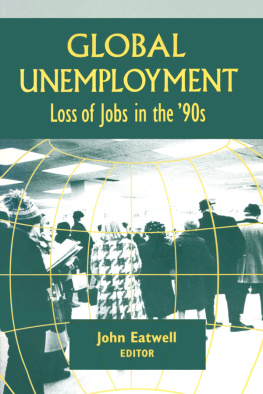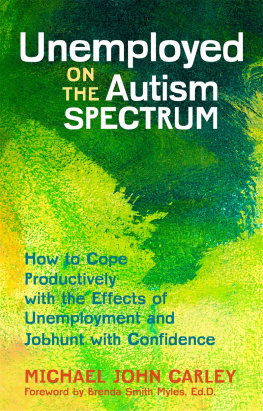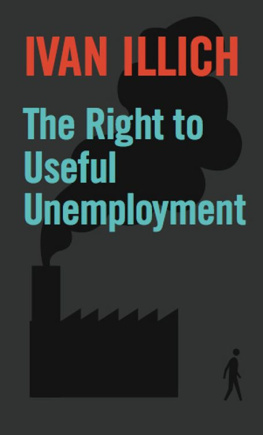John Eatwell - Coping With Global Unemployment: Putting People Back to Work
Here you can read online John Eatwell - Coping With Global Unemployment: Putting People Back to Work full text of the book (entire story) in english for free. Download pdf and epub, get meaning, cover and reviews about this ebook. year: 2016, publisher: Routledge, genre: Politics. Description of the work, (preface) as well as reviews are available. Best literature library LitArk.com created for fans of good reading and offers a wide selection of genres:
Romance novel
Science fiction
Adventure
Detective
Science
History
Home and family
Prose
Art
Politics
Computer
Non-fiction
Religion
Business
Children
Humor
Choose a favorite category and find really read worthwhile books. Enjoy immersion in the world of imagination, feel the emotions of the characters or learn something new for yourself, make an fascinating discovery.
- Book:Coping With Global Unemployment: Putting People Back to Work
- Author:
- Publisher:Routledge
- Genre:
- Year:2016
- Rating:3 / 5
- Favourites:Add to favourites
- Your mark:
- 60
- 1
- 2
- 3
- 4
- 5
Coping With Global Unemployment: Putting People Back to Work: summary, description and annotation
We offer to read an annotation, description, summary or preface (depends on what the author of the book "Coping With Global Unemployment: Putting People Back to Work" wrote himself). If you haven't found the necessary information about the book — write in the comments, we will try to find it.
Coping With Global Unemployment: Putting People Back to Work — read online for free the complete book (whole text) full work
Below is the text of the book, divided by pages. System saving the place of the last page read, allows you to conveniently read the book "Coping With Global Unemployment: Putting People Back to Work" online for free, without having to search again every time where you left off. Put a bookmark, and you can go to the page where you finished reading at any time.
Font size:
Interval:
Bookmark:
Unemployment
Unemployment

2 Park Square, Milton Park, Abingdon, Oxon OX14 4RN
711 Third Avenue, New York, NY 10017, USA
No responsibility is assumed by the publisher for any injury and/or damage to persons or property as a matter of products liability, negligence or otherwise, or from any use of operation of any methods, products, instructions or ideas contained in the material herein.
John Eatwell, editor.
p. cm.
Based on papers presented at the New School Conference on Unemployment, held at the New School for Social Research, New York, on Dec. 8, 1993.
Includes bibliographical references and index.
ISBN 1-56324-581-7 (alk. paper).
ISBN 1-56324-582-5 (pbk.: alk. paper).
1. UnemploymentCongresses.
2. Unemployment (Economic theoryCongresses).
I. Eatwell, John.
HD5707.5.G58 1995
331.137dc20 959023
CIP
ISBN 13:9781563245817 (hbk)
the New School Conference on Unemployment,
which was held at
the New School for Social Research, New York,
on Thursday, December 8, 1993.
New School for Social Research
Unemployment
Unemployment on a World Scale
Font size:
Interval:
Bookmark:
Similar books «Coping With Global Unemployment: Putting People Back to Work»
Look at similar books to Coping With Global Unemployment: Putting People Back to Work. We have selected literature similar in name and meaning in the hope of providing readers with more options to find new, interesting, not yet read works.
Discussion, reviews of the book Coping With Global Unemployment: Putting People Back to Work and just readers' own opinions. Leave your comments, write what you think about the work, its meaning or the main characters. Specify what exactly you liked and what you didn't like, and why you think so.













